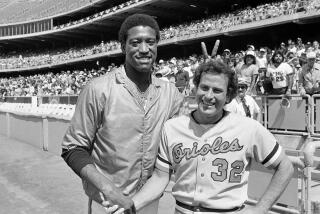Going, Going, Gone : It’s the End of Era for Rice and Stanley
- Share via
In sports, as in most of life, endings are rarely as nice as beginnings. Once, the strapping young pitcher and menacing young hitter couldn’t wait to get out on the field and show their stuff. Now, they sit in shadows of self-doubt as others are called forth. Once, they were main cogs, well-oiled from frequent use. Now, they are rusty spare parts, relics of a bygone era.
So it is that Bob Stanley and Jim Rice depart the Boston Red Sox’s scene, their huge 1989 salaries ($1.1 million for Stanley; $2.5 million for Rice) further mocking their cameo roles as the final curtain falls. Stanley is retiring after 13 seasons. Rice, who is being let go by the Red Sox after 15 seasons, will try to catch on elsewhere.
Whatever else they do the rest of their lives, they always will be known as Red Sox. It is what made them rich, famous, and yes, somewhat notorious.
It is a measure of how their abilities have ebbed that as their careers neared an end, Rice and Stanley made bigger news for off-the-field tiffs with their manager than anything else.
Last season Rice was suspended three days without pay for pulling Manager Joe Morgan into the dugout runway after Morgan had lifted him for a pinch hitter. In July, Stanley, irritated by a prolonged stretch of inactivity brought on by his ballooning earned-run average, publicly blasted his mild-mannered manager, saying he “hated” him.
A man’s ego is a terrible thing to puncture. Neither Stanley, an emotional overgrown teddy bear, nor the short-tempered, ever-smoldering Rice, who carried a proverbial chip on his shoulder bigger than any bat, took demotion lightly. After careers like theirs, could you blame them?
Until this season, when his career batting average slipped to .298, Rice was the 15th player in history -- and the only active player -- to have both a lifetime .300 average and more than 300 home runs. He had 382 home runs and 1,451 RBI and is the only player in history with three consecutive seasons of 200 hits and 35 home runs (1977-79). He hit 20 or more homers 11 times and drove in more than 100 runs in eight seasons. Reggie Jackson was awed by him. American League slugger of the late ‘70s? Jim Rice was it.
And more. He played hurt and he played hard and he played every day. And before his knees and eyes began to go, he played left field well.
If it was hard to ignore Rice’s facility for hitting into double plays or failure to hit in the clutch -- he batted cleanup in the 1986 World Series without driving in a run -- it was even harder to ignore his personality.
Sportswriters don’t like him. Whether he was at his peak or in the depths, it was always the same: There is no experience in this business more humiliating than trying to extract a few civil words from Jim Rice. When he isn’t ticked off, he’s on the verge of being ticked off. A writer for Sport Magazine said it best: “Jim Rice is the only person who can make tying his shoes a hostile act.”
Some theorize that Rice, a black from South Carolina, never got over the way his white rookie counterpart from Southern California, Fred Lynn, was idolized when they broke in in 1975. Lynn was Rookie of the Year and a star in a great World Series. Rice was on the bench with a cast on his broken wrist.
Eventually, Lynn left the Red Sox while Rice stayed the course. But if Rice was admired at Fenway, he was never loved. The best way to get love is to give it. Rice never seemed to.
Stanley, on the other hand, was a heart-on-the-sleeve guy who fairly begged for love. All too often, what he got was scorn. No Sox fan will ever forget Mookie Wilson’s at-bat with Stanley on the mound in Game 6 of the 1986 World Series. No Red Sox fan forgets that Stanley has figured in some of the uglier moments in Red Sox history. It was easy to boo Stanley. But to meet him in person and still dislike him, that was hard.
Like Rice, Stanley always wanted to be out there. Unlike Rice for most of his career, Stanley wasn’t always good enough to dictate where. He was a starter, a closer, a mop-up man. He was 15-2 in 1978 and saved 33 games in 1983. But in 1987, still haunted by Game 6, he was 4-15 with a 5.01 ERA.
With a 115-97 lifetime record, Stanley will never be regarded as one of the greats. But with all his ups and downs -- tearing up his pitching hand taking out the trash, giving up Reggie Jackson’s home run in the 1978 playoff against the Yankees -- Stanley will be remembered as one of the game’s great survivors. He pitched in more games (637) than anyone in Red Sox history. Perhaps that is as it should be. After all, whose roller-coaster career better symbolizes Red Sox futility than Stanley’s?
Stanley and Rice also symbolize a bygone era, before free agency, before ballplayers switched teams as a remote control switches stations. They are two of only 10 men in the club’s 89-year history who have played 10 or more years exclusively for the Red Sox.
Now, they are two for the road. And more sad proof that it is so much easier to say hello than goodbye.
More to Read
Go beyond the scoreboard
Get the latest on L.A.'s teams in the daily Sports Report newsletter.
You may occasionally receive promotional content from the Los Angeles Times.










